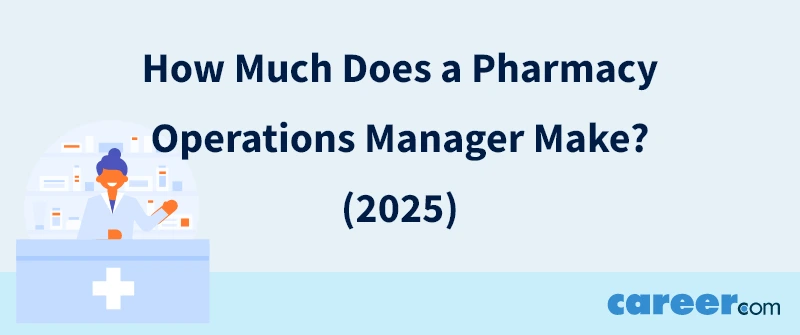How Much Does a Pharmacy Operations Manager Make? (2025)

With the U.S. BLS reporting an 11% job outlook for the years of 2023 to 2033 for pharmacy operations managers, the job is seeing a positive employment trend. Salary.com’s Real-Time Job Posting Salary Data Report also reports 89.47% more job postings for the job title as well, which directly corresponds with the government’s data.
Salary.com has also reported that pharmacy operations managers have a median salary of $169,240 per year in the United States as of June 16, 2025. Read this salary guide to get a more comprehensive overview of Pharmacy Operations Managers, job descriptions, FAQs, and job expectations.
What Does a Pharmacy Operations Manager Do?
A pharmacy operations manager’s key role includes helping properly dispense medicine to their clients as well as helping manage a pharmacy’s day-to-day operations as well.
Per Salary.com’s data, having a Doctor of Pharmacy degree is required to become a pharmacy operations manager, on top of having a state pharmaceutical license. It should also be noted that to become one, a pharmacist should have at least 5 years or more in a leadership or executive role in a pharmacy to be considered for the position.
What is a Pharmacy Operations Manager’s Salary Overview?
The average salary for pharmacy operations managers in the United States in 2025 is $169,240 per year or $86 per hour, as of June 16, 2025.
Based on Salary.com salary data, a pharmacy operations manager’s salary is between $146,168 to $197,456 per year, with most earning between $158,210 and $184,030. A pharmacy operations manager’s salary per month is $14,961.
The salary for a pharmacy operations manager is an average of $86 per hour, with hourly rates ranging from $80 to $99. The average weekly salary for pharmacy operations managers is $3,453, with weekly pay ranging from $3.193 to $3,954.
2025 Pharmacy Operations Manager Average Salary: $169,240, per year ($86 per hour)
Meanwhile, the median core compensation for a pharmacy operations manager is $120,900 per year, including salary and bonuses, and varies depending on the percentile.
| Percentile | Salary + Bonus |
|---|---|
| 10th Percentile | $150,803 |
| 25th Percentile | $162,020 |
| 50th Percentile | $174,340 |
| 75th Percentile | $192,720 |
| 90th Percentile | $209,454 |
On the other hand, a pharmacy operations manager's total salary in the US is $150,303, according to Salary.com report. The total compensation package includes benefits like healthcare ($8,352), time off ($13,280), and Social Security ($8,254), which make up 19.9% of the total compensation.
| Core Compensation | ||
|---|---|---|
| Median | % of Total | |
| Base Salary | $169,240 | 70.90% |
| Bonus | $5,100 | 2.10% |
| Value of Benefits | ||
| Median | % of Total | |
| Social Security | $12,981 | 5.40% |
| 401K/403B | $6,974 | 2.90% |
| Disability | $3,487 | 1.50% |
| Healthcare | $6,374 | 2.70% |
| Pension | $9,589 | 4.00% |
| Time Off | $24,810 | 10.40% |
What Can Affect a Pharmacy Operations Manager’s Salaries?
Various factors such as experience level, geographic location, education, and skills can significantly influence the salary of a pharmacy operations manager. Below is a breakdown of key salary components:
By Experience Level
Salary.com data shows that entry-level pharmacy operations managers who entered their organization with less than one year of experience pay $164,947. Those with more than 8 years of experience are considered experts, and the salary of a pharmacy operations manager at that level is $170,128.
| Levels | Salary |
|---|---|
| Entry Level Pharmacy Operations Manager | $164,947 |
| Intermediate Level Pharmacy Operations Manager | $165,382 |
| Senior Level Pharmacy Operations Manager | $166,396 |
| Specialist Level Pharmacy Operations Manager | $167,556 |
| Expert Level Pharmacy Operations Manager | $170,128 |
By Geographic Location
Salary for Pharmacy Operations Managers in the United States vary by geographic location due to key factors like cost of living, the local economy, and industry presence.
Among the hot cities in the United States, San Francisco, California is among the highest paying cities, with average salary being $211,360, while Dallas, TX, and Miami, FL, reflect lower average salary for pharmacy operations managers at $167,210 and $162,200 respectively.
| Cities | 25th Percentile | 50th Percentile | 75th Percentile |
|---|---|---|---|
| San Francisco, California | $197,590 | $211,360 | $229,830 |
| Washington, District of Columbia | $175,170 | $187,380 | $203,750 |
| Miami, Florida | $152,010 | $162,600 | $176,810 |
| Chicago, Illinois | $163,490 | $174,890 | $190,170 |
| Boston, Massachusetts | $176,450 | $188,750 | $205,250 |
| New York, New York | $183,350 | $196,130 | $213,270 |
| Dallas, Texas | $156,230 | $167,210 | $181,730 |
By Skills
Since being a pharmacy operations manager requires having a master’s degree or an MBA to start, most start at a similar level. However, The Real-Time Job Posting Salary Data Report has suggested that having employee relationship management and patient care skills can boost the salary of a pharmacy operations manager’s salary by 5.87% and 5.11%, respectively.
| Skill | Demand | Salary |
|---|---|---|
| Employee Relationship Management | 3.67% | 5.87% |
| Patient Care | 54.43% | 5.11% |
| Healthcare Industry | 60.09% | 5.09% |
| Immunology | 66.19% | 4.81% |
| Patient Safety | 3.81% | 3.87% |
| Billing | 20.89% | 3.76% |
By Education
Since pharmacy operations managers require a doctorate, most employees have bachelor’s degrees (48.7.5%). Master's (MA) and associate degree holders are the next most prominent ones, holding at least 38.9% and 10.3% of positions respectively.
| Degree Level | % of Users with this Level of Education |
|---|---|
| Bachelors | 33.10% |
| Masters | 21.3% |
| Doctorate | 43.1% |
How to Become a Pharmacy Operations Manager?
To become a fully-fledged Pharmacy Operations Manager, consider following these steps:
- Acquire a Doctor of Pharmacy degree: Since the role needs a doctorate to acquire, it’s highly suggested for those applying to the role to have a Doctor of Pharmacy degree beforehand from accredited schools.
- Gain relevant experience: Most employers look for candidates with at least 5 years of related experience in a pharmacy setting. Skills like patient care and knowledge of the healthcare industry are additional perks that can boost the income of a pharmacy operations manager further.
- Acquire all the licenses: After acquiring a degree and the needed experience, pharmacy operations managers need to take and pass exams like the North American Pharmacist Licensure Exam (NAPLEX), Multistate Pharmacy Jurisprudence Exam (MPJE), and other state-mandated exams to help them with their role.
What are FAQs about Pharmacy Operations Managers?
Here are some of the common questions about a Pharmacy Operations Manager’s salary:
How much does a pharmacy operations manager earn on average?
Last updated on April 13, 2025, Salary.com reports that the salary for a pharmacy operations manager’s average is $169,240 per year, or $86 per hour, which can translate to $14,961 monthly. The highest salary for a pharmacy operations manager is $170,128 for an expert level Pharmacy Operations Manager.
What is the qualification for a pharmacy operations manager?
Pharmacy operations managers are required to have a Doctor in Pharmacy as well as 5 years of prior experience working in a pharmacy or other similar company to be considered for the role.
What does a Pharmacy Operations Manager do?
A pharmacy operations manager's main responsibility is to help manage a pharmacy’s daily operations as well as advising, confirming, searching, and reviewing the medicine that a physician will give people for their designated diagnosis, reducing human error and heling save lives in the process.



